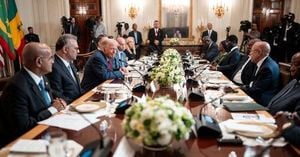As tensions between India and Pakistan escalate, India is conducting its largest nationwide civil defense drill in over 50 years, a move that underscores the increasing risk of conflict between the two nuclear-armed nations. The drill, taking place on May 7, 2025, comes in the wake of a terrorist attack in Jammu and Kashmir that left 26 people dead, further straining diplomatic relations between New Delhi and Islamabad.
The Indian government announced the drill, which involves 244 districts across the country, primarily in areas near the border, coastal regions, and other vulnerable locations. The exercises include testing alarm sirens, conducting evacuation drills during power outages, providing emergency response training, and teaching skills to respond to potential attacks. This extensive preparation is seen as a direct response to the heightened tensions following the recent violence.
In Kashmir and the bordering regions, training activities began several days prior to the drill. Residents reported that many had not witnessed such a large-scale military exercise since the 1971 war between India and Pakistan. The Indian Ministry of Interior has emphasized that, while the current measures are non-military, the rising tensions could necessitate a shift in strategy.
In the aftermath of the terrorist attack, India downgraded its diplomatic relations with Pakistan, suspended bilateral trade routes, and closed airspace to each other's airlines. Furthermore, New Delhi temporarily halted the implementation of a portion of the water-sharing agreement, affecting the flow of water from key rivers that Pakistan relies on for agriculture. This strategic move has raised concerns in Islamabad, with Pakistani Defense Minister Khawaja Asif warning that any unilateral changes to water management could be considered a serious provocation.
As the situation escalated, on the morning of May 7, India launched missile strikes targeting what it described as terrorist camps in Pakistan-controlled Kashmir. The strikes resulted in at least 26 fatalities, with additional injuries reported. Pakistan's military accused India of waging war, stating that missiles were fired at six locations within Pakistan-administered Kashmir and Punjab province. In retaliation, Pakistan claimed to have shot down five Indian fighter jets.
Indian officials justified the airstrikes, claiming they targeted infrastructure linked to the massacre of tourists in Kashmir that occurred in April. This incident, which killed 26 individuals, primarily tourists, had already sparked outrage in India and intensified calls for military action against Pakistan.
Pakistani Prime Minister Shehbaz Sharif condemned the airstrikes and characterized them as an act of war, asserting that Pakistan has every right to respond decisively. He convened an emergency meeting of the National Security Committee to discuss the appropriate response. Analysts have noted that this marks one of the most significant military confrontations between the two nations in years, with both sides displaying a readiness to engage in conventional military operations despite possessing nuclear capabilities.
In the wake of these developments, United Nations Secretary-General Antonio Guterres expressed deep concern over the escalating tensions and called for maximum restraint from both sides. He emphasized that the world cannot afford another military confrontation between India and Pakistan, given the potential consequences.
The situation remains precarious, with heavy fighting reported along the Line of Control, the de facto border dividing the contested region of Kashmir. Local residents have reported hearing explosions and witnessing panic as people fled their homes in response to the missile strikes. In Muzaffarabad, the capital of Pakistan-administered Kashmir, authorities declared a state of emergency in hospitals as the number of casualties rose.
Amidst this turmoil, Indian politicians from various parties have hailed the airstrikes as a necessary response to terrorism, with Defense Minister Rajnath Singh proclaiming it a "Victory of Mother India" on social media. This rhetoric further complicates the already tense atmosphere, as both nations appear to be preparing for a prolonged standoff.
The historical context of the India-Pakistan conflict adds layers of complexity to the current situation. Since gaining independence from British rule in 1947, the two countries have fought multiple wars over Kashmir, a region claimed by both. The area has been a flashpoint for violence and diplomatic stalemates, with the local population caught in the crossfire of national interests.
Article 370 of the Indian Constitution, which granted partial autonomy to Jammu and Kashmir, was revoked in 2019, a move that was met with fierce opposition from Pakistan and heightened tensions in the region. The aftermath of this decision has seen a resurgence of violence and a renewed push for independence among some factions within Kashmir.
As the international community watches closely, calls for dialogue and de-escalation are growing louder. The United States has also expressed concern over the situation, urging both nations to seek peaceful resolutions to their longstanding disputes. The potential for miscalculation or miscommunication in this volatile environment remains high, and the stakes could not be greater.
In summary, as India conducts its civil defense drills and engages in military actions against Pakistan, the risk of a larger conflict looms. The recent terrorist attack has exacerbated existing tensions, prompting both governments to prepare for the possibility of further escalation. The world watches with bated breath, hoping for restraint and a return to dialogue before the situation spirals out of control.




